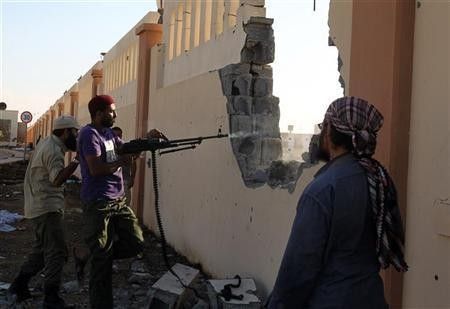Libya News Update, a New Syrian Army and a Killing in Bahrain

It's been nine months since the beginning of the Arab Spring, and North African and The Middle East are still very much in turmoil.
Libya: The National Transitional Council, Libya's new, interim government, would like very much to declare victory and to begin building the post-Gadhafi era. However, the remaining loyalist forces in Sirte are still putting up a strong resistance to the revolutionary fighters surrounding the city.
We started the attack at 6 a.m. today. The first group hit the outskirts of Sirte. We were fired on by Gadhafi snipers. We had many soldiers wounded, commander Altaib Aleroebi of the ex-rebels' West Mountain Brigade told The Associated Press.
At least 12 NTC fighters were killed and 195 wounded during Friday's attack on Sirte.
“We are receiving many gunshot wounds, mostly to the head, neck and chest from sniper fire. We have received many injured today, Dr Ahmed Mohammed Tantoun said to The Telegraph.
With support coming in from Benghazi, NTC troops currently have Sirte surrounded and are attempting to squeeze pro-Gradhafi soldiers into a narrower and narrower area.
Council leaders have stated that once they capture Sirte -- the birthplace of Gadhafi -- they will schedule elections and begin establishing a permanent government.
Gadhafi is still in hiding and his whereabouts are unknown. Nonetheless, the deposed leader was allegedly able to deliver another audio address to Syria's Al-Rai TV. In the tape, a man thought to be Gadhafi called on all Libyans to rise up against their new leaders.
I call on the Libyan people, men and women, to go out into the squares and the streets and in all the cities in their millions, Gadhafi said. I say to them, do not fear anyone. You are the people, you belong to this land. Make your voice heard against NATO's collaborators.
Be courageous, rise up, go out in the streets, he said. Raise the green flag in the skies ... the conditions in Libya are unbearable.
Syria: President Bashir al-Assad has thus far proved to be more effective at curbing social unrest than his counterparts in Egypt, Tunisia and Libya were, although protests are swelling in Syria.
Assad's brutality and orders to shoot unarmed civilians have provoked a number of soldiers to defect. They have formed the Free Syrian Army, the first militant answer to the anti-government sentiments.
“It is the beginning of armed rebellion,” SFA's Col. Riad al-Assad told The Washington Post.
“You cannot remove this regime except by force and bloodshed. But our losses will not be worse than we have right now, with the killings, the torture and the dumping of bodies.
According to varying sources, iterations of the Free Syrian Army have killed between 70 and 700 of President Assad's security forces.
All Syria news reports must come with a disclaimer. The country prohibits foreign media and the only local media is state-run. Therefore, all of the the reports are either from the government, or from activists on the ground. Neither can be said to be objective, but the activist reports are probably accurate.
Bahrain: Compared to other Arab Spring demonstrations, Bahrain has been relatively quiet recently, although the Pearl Revolution started horrendously with government soldiers killing civilians at a funeral.
On Thursday, a teenager named Ahmed Jaber was killed during a clash between protestors and security forces. Human rights groups claim that he was killed by a pellet gun bullet that hit it heart. According to Voice of America, the government has said it is investigating the case.
© Copyright IBTimes 2024. All rights reserved.





















